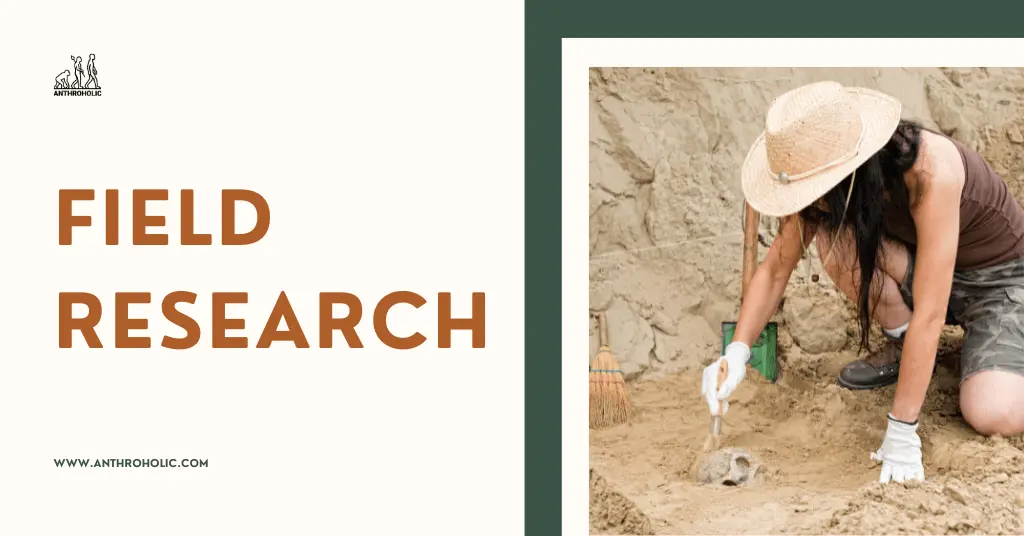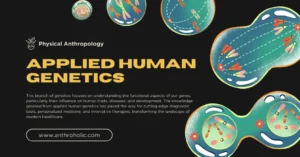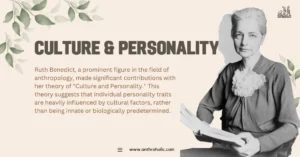AI Answer Evaluation Platform Live Now. Try Free Answer Evaluation Now
Field Research
Field research, often referred to as ethnographic research, is an integral aspect of anthropological study that involves the direct observation and participation within a specific cultural or social group [1]. It is a method that goes beyond mere data collection and seeks to provide a profound understanding of people’s behavior, beliefs, social norms, and structures by studying them in their natural environment. The significance of field research lies in its immersive nature, which allows the researcher to experience the lived realities of the study population, thereby gaining insights that are usually unattainable through traditional quantitative methods.

The Importance of Field Research in Anthropology
Field research is fundamental to anthropology. As Malinowski [2] noted, the “goal of anthropology is to grasp the native’s point of view, his relation to life, to realize his vision of his world.” This underscores the importance of field research in anthropology, as it is the primary method through which this goal is achieved.
For instance, one of the most renowned field researches in anthropology was conducted by Margaret Mead in Samoa during the 1920s. Her studies on adolescent behavior in Samoa provided significant insights into the impact of cultural factors on human development [3].
Moreover, field research in anthropology provides a platform for the decolonization of knowledge. It can help to challenge the Western-centric perspectives that have traditionally dominated social sciences and to highlight the rich diversity of human experiences across the globe.
Preparing for Field Research
Choosing the Field Site
Choosing a field site is a crucial initial step in field research. The site must be relevant to the research question and provide ample opportunities for data collection. For instance, Bronisław Malinowski’s selection of the Trobriand Islands for his ground-breaking research on the Kula ring was based on the unique economic system that existed there [2].
Ethical Considerations
Ethics are a cornerstone of anthropological field research. Researchers must ensure informed consent, protect anonymity, and avoid causing harm to participants. E. E. Evans-Pritchard’s fieldwork among the Nuer provides an example of respecting local customs and beliefs, thus upholding ethical principles [4].
Constructing a Research Question
A well-defined research question guides the entire research process. The question must be clear, manageable, and answerable within the constraints of the field research. For example, Margaret Mead’s question, “Are the disturbances which vex our adolescents due to the nature of adolescence itself or to civilization?” directed her pioneering study in Samoa [3].
Gaining Access and Building Trust
Gaining access to a community and building trust are vital to successful field research. This often involves negotiations with gatekeepers, demonstrating respect for local norms, and spending time in the community. Annette Weiner’s study of the Trobriand Islanders, for instance, underlines the importance of building trust through long-term engagement [5].
Data Collection Techniques
Participant Observation
Participant observation, a cornerstone of anthropological research, involves researchers immersing themselves in the study population’s daily life. It allows the researcher to witness behaviors and events firsthand, gaining an in-depth understanding of cultural and social practices.
- Advantages and Challenges: Advantages include obtaining first-hand, in-depth, and nuanced data. Challenges involve maintaining objectivity and managing culture shock.
- Case Studies: Malinowski’s work in the Trobriand Islands demonstrates participant observation’s depth, providing valuable insights into the inhabitants’ socio-economic practices.
Interviews and Focus Groups
Interviews involve one-on-one conversations between the researcher and the participant, while focus groups are discussions within a small group, moderated by the researcher.
- Formulating Effective Questions: Well-designed, clear, unbiased, and culturally appropriate questions are crucial for generating valuable data.
- Interpreting Responses: This involves understanding cultural nuances and non-verbal cues, in addition to the verbal responses.
Using Archival and Secondary Data
Archival and secondary data involve using pre-existing data such as historical documents, census data, or previous research findings, providing rich context and background to the study.
Employing Technology in Field Research
Technology aids in data collection, management, and analysis. It ranges from digital recorders and cameras to specialized software. Their use, however, must be considerate of ethical and cultural implications.
Data Analysis and Interpretation
Methods of Data Coding and Analysis
In anthropological research, data collected are often qualitative and voluminous. To manage this, researchers use coding, which involves breaking down data into manageable units and assigning labels to these units. This can be done manually or using software such as NVivo or ATLAS.ti. Thematic analysis, an approach that identifies patterns or themes within the data, is often employed [6].
Ensuring the Validity and Reliability of Results
Ensuring the validity and reliability of results is crucial. Triangulation, which involves using multiple methods, sources, or investigators to gather data, can increase the validity of findings. Member checking, where research findings are presented back to the participants for verification, can also enhance validity [7].
Addressing Bias and Reflexivity
Addressing bias and reflexivity, the researcher’s self-awareness of their role and influence on the research, is essential in anthropological field research. Researchers must acknowledge their biases and strive to minimize their impact on data collection and interpretation. Reflexive journals and peer debriefing can be used to address bias and promote reflexivity.
The Future of Field Research in Anthropology
Emerging Trends and Techniques
The future of anthropological field research is likely to be shaped by innovative methodologies and interdisciplinary approaches. Multisited ethnography, for example, has emerged in response to the interconnectedness of today’s world. Instead of focusing on one locale, researchers trace connections, associations, and relationships across different sites. Similarly, collaborative ethnography, which involves active collaboration between the researcher and the subjects, is also gaining traction as a way to reduce power imbalances inherent in research.
The Impact of Globalization and Digitalization
Globalization and digitalization have profound implications for anthropological field research. Globalization, with its increasing cultural exchanges and migrations, encourages anthropologists to rethink traditional concepts of culture and field sites.
Simultaneously, digitalization has brought forth new realms of study, such as digital cultures, and new research tools. For instance, virtual ethnography allows researchers to study online communities. Also, digital tools like GIS, data visualization software, and digital databases are increasingly incorporated into research.
Yet, as digital technology becomes more prevalent, ethical considerations about privacy and consent in digital spaces are emerging as significant concerns.
Conclusion
Summary of Key Points
This article delved into the intricacies of field research in anthropology, highlighting its historical significance, preparation stages, data collection techniques, data analysis and interpretation methods, and future trends. The role of participant observation and ethnography was underscored, as were other techniques such as interviews, focus groups, and the use of archival and secondary data. We also examined the growing influence of technology in field research and the emergence of digital ethnography.
Implications for the Field of Anthropology
The ongoing development of field research methods as a result of technology breakthroughs and worldwide shifts has significant consequences for anthropology. The development of digital tools and places expands the scope of research and puts conventional research ethics to the test. The knowledge of human cultures and communities is shifting towards one that is more inclusive and connected, as evidenced by new trends like multisited and collaborative ethnography. These changes not only broaden our understanding of anthropology but also provide difficulties that need constant discussion and adaptation among researchers. It is crucial that we continue to be adaptable, moral, and creative in how we conduct anthropological fieldwork as we move forward.
References
[1] Emerson, R. M., Fretz, R. I., & Shaw, L. L. (2011). Writing ethnographic fieldnotes. University of Chicago Press.
[2] Malinowski, B. (1922). Argonauts of the Western Pacific. Routledge & Kegan Paul.
[3] Mead, M. (1928). Coming of age in Samoa: A psychological study of primitive youth for western civilisation. William Morrow & Co.
[4] Evans-Pritchard, E. E. (1940). The Nuer: A description of the modes of livelihood and political institutions of a Nilotic people. Oxford University Press.
[5] Weiner, A. B. (1988). The Trobrianders of Papua New Guinea. Holt, Rinehart and Winston.
[6] Braun, V., & Clarke, V. (2006). Using thematic analysis in psychology. Qualitative Research in Psychology, 3(2), 77-101.
[7] Lincoln, Y. S., & Guba, E. G. (1985). Naturalistic inquiry. Sage.
[8] Guillemin, M., & Gillam, L. (2004). Ethics, reflexivity, and “ethically important moments” in research. Qualitative Inquiry, 10(2), 261-280. https://doi.org/10.1177/1077800403262360




